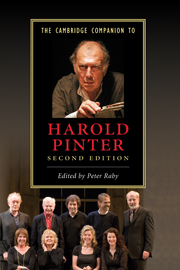Book contents
- Frontmatter
- Introduction
- Part I Text and Context
- 1 Pinter, politics and postmodernism (1)
- 2 Pinter and the 1950s
- 3 The sacred joke: comedy and politics in Pinter’s early plays
- 4 Tales of the city: some places and voices in Pinter’s plays
- 5 Pinter and twentieth-century drama
- 6 Harold Pinter, screenwriter: an overview
- 7 Speaking out: Harold Pinter and freedom of expression
- Part II Pinter and Performance
- Part III Reactions to Pinter
- Bibliography
- Main Index
- Works Index
- Series List
5 - Pinter and twentieth-century drama
from Part I - Text and Context
Published online by Cambridge University Press: 28 November 2009
- Frontmatter
- Introduction
- Part I Text and Context
- 1 Pinter, politics and postmodernism (1)
- 2 Pinter and the 1950s
- 3 The sacred joke: comedy and politics in Pinter’s early plays
- 4 Tales of the city: some places and voices in Pinter’s plays
- 5 Pinter and twentieth-century drama
- 6 Harold Pinter, screenwriter: an overview
- 7 Speaking out: Harold Pinter and freedom of expression
- Part II Pinter and Performance
- Part III Reactions to Pinter
- Bibliography
- Main Index
- Works Index
- Series List
Summary
In 1956 Harold Pinter trod the boards in Bournemouth and Torquay in over thirty thrillers and comedies, the standard repertory company staple of the pre- and post-war periods, while J. B. Priestley, Noel Coward and Terence Rattigan dominated the West End theatre with comforting spiritualism, stylish comedy of manners and sentimentalised social problem play, all designed to reassure the self-applauding middle-class patrons, through laughter or tears. Alternatively, by the early 1950s, the plays of Arthur Miller and Tennessee Williams with their contrasting realistic modes of incidental expressionism (Death of a Salesman, 1949) and passionate naturalism (A Streetcar Named Desire, 1947) were quite free from the all-constrictive self-censorship of the British class system dominated by virtual terror of the vulgar and lower class. Along with changing post-war social conditions the seeming freedom signalled by the Americans provided an impetus for the rise of the Angry Young Men (pre-eminently John Osborne, Arnold Wesker and John Arden) at the Royal Court Theatre, from the annus mirabilis of 1956. Of equal importance, but less sensational in immediate impact was the translation of French absurdism, most famously Samuel Beckett and Eugène Ionesco, to London productions at the Arts Theatre (respectively, Waiting for Godot, 1955; The New Tenant, 1956). With his outstanding success by the early 1960s, Pinter was frequently associated with the social realism of the Angry Young Men and with the absurdism of Beckett and Ionesco. Furthermore, it is probably safe to say that there is not a single dramatist of the twentieth century with whom Pinter has not been compared or contrasted, from Ibsen to David Mamet.
- Type
- Chapter
- Information
- The Cambridge Companion to Harold Pinter , pp. 74 - 87Publisher: Cambridge University PressPrint publication year: 2009
- 3
- Cited by



